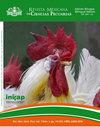Efecto de la hesperidina añadida a las dietas de codorniz sobre los gases en sangre, la bioquímica sérica y HSP 70 bajo estrés por calor
IF 0.6
4区 农林科学
Q3 AGRICULTURE, DAIRY & ANIMAL SCIENCE
引用次数: 0
Abstract
The aim of this study was to determine the effects of flavonoid, which is a product of citrus production, on blood parameters and HSP 70 concentration in quails applied at thermoneutral and heat stress. In this study, 160 quails (Coturnix coturnix japonica, male), 6 wk old and 150-200 g live weight, were housed in cages for 1 wk of exercise and 5 wk of trial period. The study design consists of 4 groups of 40 animals and 4 subgroups with 10 animals in each group. Thermoneutral (24 ± 0.1 o C) groups are NC (0 g hesperidin/kg basal feed) and NHES3 (3 g hesperidin /kg basal feed) and heat stress (34 ± 0.1 oC) groups are HC (0 g hesperidin/kg basal feed) and HHES3 (3 g hesperidin /kg basal feed) were randomly generated. In the case of heat stress, pO2, pH, HCO3, Cl concentrations decreased in the HHES3 group compared to the HC group (P<0.05). ALP enzyme concentration showed a significant decrease in the HHES3 group compared to the HC group in the heat stress condition. Heat shock protein (HSP70) protein level increased in blood serum, kidney, liver and thigh tissues in HC group with cellular stress during heat stress; however, HSP70 concentration decreased significantly in the HHES3 group. As a result, positive effects of hesperidin supplementation in the diet were found in both heat stress and thermoneutral conditions.鹌鹑饲粮中添加橙皮苷对热应激条件下血气、血清生化和hsp70的影响
本研究旨在研究柑橘类黄酮对热中性和热应激条件下鹌鹑血液参数和hsp70浓度的影响。试验选用160只6周龄、150 ~ 200 g活重的雄性鹌鹑(Coturnix Coturnix japonica,雄),笼内饲养1周运动期和5周试验期。研究设计分为4组,每组40只动物,4个亚组,每组10只动物。随机选取热中性(24±0.1℃)组为NC组(0 g橙皮苷/kg基础饲料)和NHES3组(3 g橙皮苷/kg基础饲料),热应激(34±0.1℃)组为HC组(0 g橙皮苷/kg基础饲料)和HHES3组(3 g橙皮苷/kg基础饲料)。热应激情况下,与HC组相比,HHES3组pO2、pH、HCO3、Cl浓度降低(P<0.05)。热应激条件下,与HC组相比,HHES3组ALP酶浓度显著降低。热应激时HC组血清、肾、肝、大腿组织热休克蛋白(HSP70)水平升高;HHES3组HSP70浓度明显降低。因此,在热应激和热中性条件下,饲料中添加橙皮苷的积极作用都被发现。
本文章由计算机程序翻译,如有差异,请以英文原文为准。
求助全文
约1分钟内获得全文
求助全文
来源期刊

Revista Mexicana de Ciencias Pecuarias
AGRICULTURE, DAIRY & ANIMAL SCIENCE-
CiteScore
1.20
自引率
0.00%
发文量
93
审稿时长
>12 weeks
期刊介绍:
The MEXICAN MAGAZINE OF SCIENCES PECUARIAS is an organ of scientific and technical diffusion of the livestock sector. Its periodicity is quarterly and arbitrated by pairs in the double-blind mode. Its objective is to make known the results of the research carried out by any scientific institution, in Mexico and in any part of the world, related to the livestock sciences, particularly those that refer to the different disciplines of Veterinary Medicine and Animal Science. The Journal is bilingual, publishes the complete articles in Spanish or English and is included in various indexing services and international dissemination platforms, such as the Index of Mexican Journals of Scientific and Technological Research of the National Council of Science and Technology (CONACYT); In the EBSCO Host database; In the Network of Scientific Journals of Latin America and the Caribbean, Spain and Portugal (RedALyC); In the Ibero-American Network of Scientific Journals of Free Access Veterinary Medicine. Indexed in the ISI Journal Citation Report Science Edition; And Elsevier''s SCOPUS and EMBASE indices.
 求助内容:
求助内容: 应助结果提醒方式:
应助结果提醒方式:


